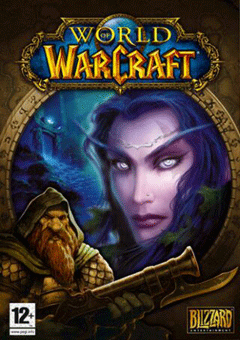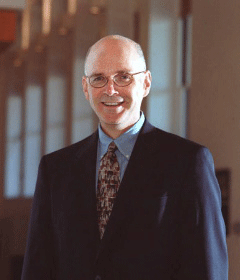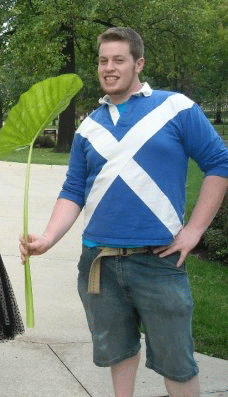Green Gaming
Air Date: Week of February 13, 2009

World of Warcraft (Photo: Blizzard Entertainment)
Over 12 million people around the world play the interactive online game World of Warcraft. Now, Stanford professor Byron Reeves wants committed computer gamers to commit to home energy efficiency. Using smart metering technology, characters in the game would gain points for real-life energy efficiency improvements. Professor Reeves tries to sell host Bruce Gellerman and game aficionado Colin Ahearn on his idea.
Transcript
GELLERMAN: President Obama’s stimulus package calls for 40 million smart electric meters to be installed in American homes. Oh, sure they’re smart - but can they play World of Warcraft?!?
[SOUND OF WORLD OF WARCRAFT: Four years have passed since the mortal races banded together and stood united against the might of the Burning Legion. Though Azeroth was saved, the tenuous pact between the Horde and the Alliance has all but evaporated…]
GELLERMAN: World of Warcraft, known as WOW to aficionados, holds the Guinness Book Record as the most popular Massively Multiplayer Online Role-Playing Game. WOW!
Massive yes. More than 11 million people around the world play World of Warcraft, making mayhem with the Horde and the Alliance, earning points, defeating monsters.
[DRUM AND GAME SOUNDS]
GELLERMAN: Since both World Of Warcraft and smart electric meters are on-line - Professor Byron Reeves of Stanford University believes the raw power of WOW in the virtual world could be harnessed to save energy in the real world.
REEVES: It’s a chance to play with a team. It’s a chance to meet people, a chance to represent yourself in media rather than actually sitting on the other side of the screen only absorbing media. It’s a chance to get feedback, to go on quests, to be engaged with groups, to do a lot of the different things that people do in real life in a way that is a whole lot of fun.
GELLERMAN: So how does it work? Let’s say I’m a subscriber to World of Warcraft, and I’ve got my account. How does it tie into my meter?
REEVES: So, imagine that you’re in your home, you’re signed into this game, you have played this game before. You’re on a team. You’re in an entertainment context. You have a representation of yourself in this game just like you do in all the entertainment games. And you make a decision in a game to turn off the lights in an unused bedroom. As soon as you do that, the smart meter recognizes that, sends the information through the network to your computer, and your house turns a shade of green that it wasn’t before. And, if I’m using less electricity, my team might do well, I get goal pieces and points, whatever the game designers think is fun. In other words, you get feedback in an entertainment game about what you’re doing in the real world.

Stanford university professor Byron Reeves
GELLERMAN: So people will do something in a virtual world for points that they wouldn’t do in the real world for money? I mean, I could save money by simply turning off my lights.
REEVES: That’s a good question. So the whole goal here is to align entertainment and fun with utility and community value. So, of course, you could change your energy usage because you had read all the science about climate change and you knew something about energy usage in the house and you were interested in saving six cents here, a dollar there, two dollars there on your energy bill. But we don’t think that that will be enough motivation at scale for lots of people to get into this. So if you can align that goal with “let’s have some fun, let’s go on a quest, let’s have a team activity, let’s see who can do this better than others, let’s help each other” – all the different features of games that are important. And if we can get that going at the same time as the community value, we might have something special.
GELLERMAN: Well, Professor, let’s talk to a gamer. We have on the line Colin Ahearn, who happens to be the brother of our producer, Ashley Ahearn. Hi Colin.
AHEARN: Hi
GELLERMAN: So, you’re a game player. How much of your life do you dedicate to this game?
AHEARN: In my life, when I played heavily, it could be as much as eight hours a day. But recently I’ve been cutting back due to other commitments, such as college and everything that that entails, socializing, school work and writing papers and things.
GELLERMAN: Yeah, life.
AHEARN: Yeah, exactly, the real world.
[LAUGHING]
GELLERMAN: Well what about, you know, this idea of Professor Reeves’?

World of Warcraft (Photo: Blizzard Entertainment)
AHEARN: I think it’s an excellent idea. But one of the main things I notice is World of War Craft players are really hobbyists above all else. And that is – you create an avatar that represents you in a very real way, but in a very virtual environment. And that’s important to players because everything they do has some effect, either through an award, a reward or in some way bettering that character. And I think something that’s going to be very important to stress with the game for it to really take off is the rewards that can be achieved in game for achievements that they themselves do outside of the game, like turning off a light or doing less dishes or doing less laundry.
GELLERMAN: But, you know, Colin, I have a picture of you sitting there with all the lights off so you can save energy so you can make points so you can play your game, sitting there playing the game in the dark.
AHEARN: Yeah. That would be an extreme way to go about it. Absolutely.
REEVES: I think Colin actually hit on one of the features from our laboratory work that’s the most important. The notion of feedback. We know that feedback really works well when it’s tightly coupled with the behavior that’s generating the feedback. So, this could be a huge feature of the game. And it’s also something that the gamer generation, those people like Colin, that spend a lot of time in this game, have a reason to expect in non-entertainment contexts. So, a lot of these younger folks are looking for direction and feedback moment by moment.

Colin Ahearn green gaming in the real world(Photo: Colin Ahearn)
GELLERMAN: So Colin, how would the game be constructed so that you’d want to play it and save energy?
AHEARN: I think the most important aspect that – the addicting part to me that would make it something I would want to do - is a leader board is a really good idea. I like the idea that with the top players in the nation who use the least energy being able to compare yourself to them is key. It just generates that competition that brings people to a game. Also, it’s the quick, immediate reward.
GELLERMAN: You know, Professor, it sounds very powerful. I mean you’ve got 11 million players of this game on the planet. But the idea of social control by way of the net sounds a little creepy.
REEVES: Well, that may be in part a generational issue. I’m not sure it’s creepy to imagine yourself voluntarily entering a game space, you know, with friends, maybe some real life friends that you’ve brought in, maybe a dorm floor, maybe a neighborhood plays together, so it’s not only new people that you meet. I think it’s really - people are very comfortable with this. This is the facebook, myspace generation. We’re establishing, initiating social contact. The threshold for that is much lower. I think people would be very comfortable with it. If, as Colin said, it can be engaging and done with a great narrative and great characters and all the things that make movies and games and entertainment special.
GELLERMAN: Bryon Reeves is a professor at the department of communications at Stanford University in California.
GELLERMAN: And Colin Ahearn was an avid World of Warcraft player. These days he’s a junior at Oberlin College in Ohio. Colin, thanks.
AHEARN: Thanks for having me.
Links
To see a demo video of professor Reeves' gaming idea click here
Living on Earth wants to hear from you!
Living on Earth
62 Calef Highway, Suite 212
Lee, NH 03861
Telephone: 617-287-4121
E-mail: comments@loe.org
Newsletter [Click here]
Donate to Living on Earth!
Living on Earth is an independent media program and relies entirely on contributions from listeners and institutions supporting public service. Please donate now to preserve an independent environmental voice.
NewsletterLiving on Earth offers a weekly delivery of the show's rundown to your mailbox. Sign up for our newsletter today!
 Sailors For The Sea: Be the change you want to sea.
Sailors For The Sea: Be the change you want to sea.
 The Grantham Foundation for the Protection of the Environment: Committed to protecting and improving the health of the global environment.
The Grantham Foundation for the Protection of the Environment: Committed to protecting and improving the health of the global environment.
 Contribute to Living on Earth and receive, as our gift to you, an archival print of one of Mark Seth Lender's extraordinary wildlife photographs. Follow the link to see Mark's current collection of photographs.
Contribute to Living on Earth and receive, as our gift to you, an archival print of one of Mark Seth Lender's extraordinary wildlife photographs. Follow the link to see Mark's current collection of photographs.
 Buy a signed copy of Mark Seth Lender's book Smeagull the Seagull & support Living on Earth
Buy a signed copy of Mark Seth Lender's book Smeagull the Seagull & support Living on Earth

